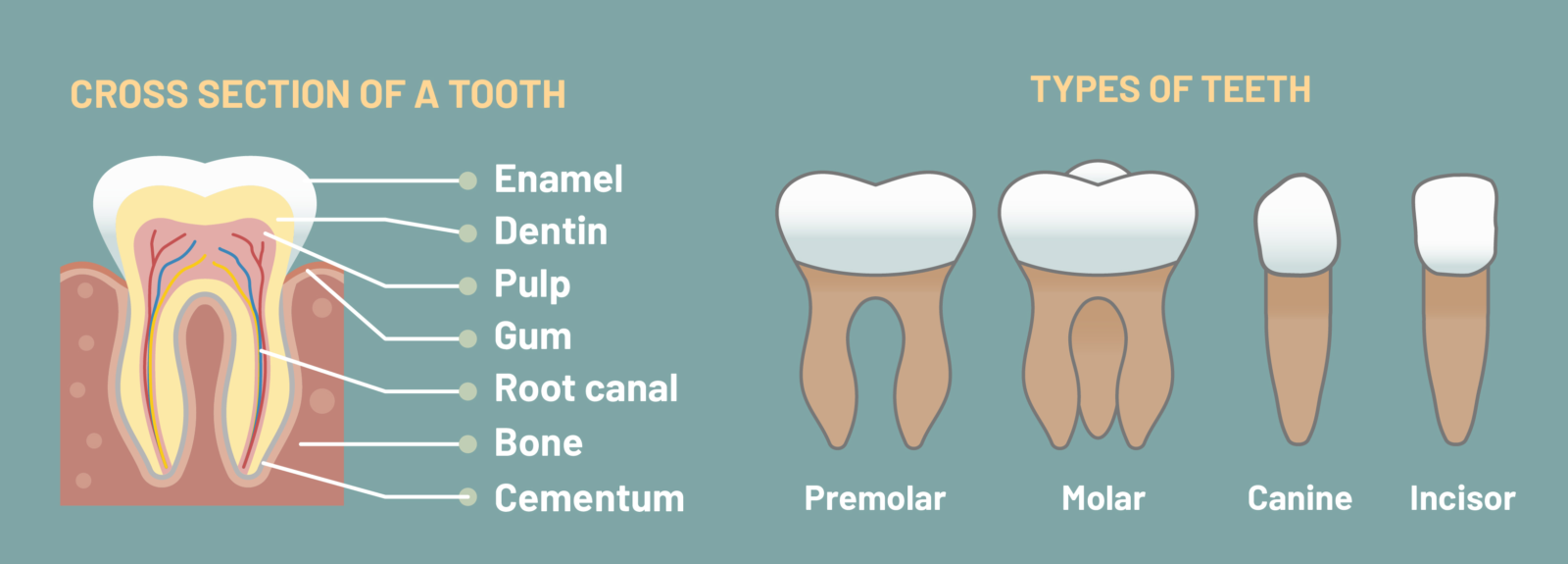Strong tooth enamel is essential if you want to have a healthy smile, but many people take tooth enamel for granted or are unaware of the vital role it plays in helping to protect your teeth and keeping them strong and cavity-free. Tooth enamel forms a protective shell around each tooth; without it, the risk of tooth decay and infections increases substantially.
What is the Importance of Tooth Enamel?
Your tooth enamel contains minerals including calcium and phosphate and is the hardest substance in the human body, tougher even than bone, and it needs to be. Each day, your teeth need to work hard, biting and chewing food so your body can extract the maximum amount of nutrition from your diet. Every time you bite down, there is a risk that something too hard could break or chip your tooth enamel. Even though tooth enamel is hardwearing, over time, it can become damaged and thinner and gradually wear down, leaving you at risk of developing dental problems like tooth decay.
What Can Damage Tooth Enamel?
Tooth enamel can be damaged by tooth decay, which is an infection. Several factors are involved in tooth decay, including oral bacteria found in dental plaque, dietary habits, saliva composition, and tooth structure. Some people have enamel hypoplasia, a condition that occurs while teeth are still developing, resulting in thinner enamel that is less resistant to tooth decay. A hyperplastic tooth will have white spots, grooves or pits on the surface of the enamel.
Tooth decay begins when tooth enamel is weakened or demineralised due to a build-up of plaque bacteria. Dental plaque consists of a sticky film that gradually coats tooth surfaces between regular oral care and is why a good oral hygiene routine is so important for strong, healthy teeth. These plaque bacteria metabolise sugars in food particles trapped on and between your teeth after meals. As they metabolise these sugars, they produce acid.
When tooth enamel is exposed to these acids, it causes demineralisation, a process where minerals like calcium and phosphate are removed from the enamel, leaving it softened. Acidity levels in the mouth can remain high for half an hour to an hour after eating. As these levels return to a more normal pH, remineralisation occurs. During remineralisation, some of those minerals are redeposited back into the tooth enamel, helping to reharden it.
What Happens to Teeth Without Strong Tooth Enamel?
The more often your teeth are exposed to acids, the faster the rate of demineralisation. Even with remineralisation, tooth enamel will become thinner, eventually resulting in cavities. Without the protection of strong tooth enamel, teeth can become more sensitive to temperature changes. For example, whenever you have anything hot or cold or very sweet, it could cause your teeth to twinge uncomfortably. As tooth enamel thins, it exposes more of the natural tooth colour in the dentine underneath so that teeth can look darker, stained and discoloured.
Is It Possible to Remineralise Teeth? How We Can Help
Various strategies can help promote remineralisation, reducing damage to your tooth enamel. Tandara Dental Centre can provide a tailored programme to help you maintain strong, healthy tooth enamel based on your dental and medical health. When you come to see us for a checkup, we can assess the health of your teeth enamel, and if you are prone to getting cavities, we can try to work out why this is happening and how to prevent it in the future. We may look at the quality and quantity of your saliva and other factors like your oral care routine and diet.
The Importance of Saliva in Remineralisation
Minerals removed during demineralisation remain in your saliva, so the effectiveness of remineralisation can depend on the composition of your saliva and the quantity available. If you do not have enough saliva, a condition called dry mouth or xerostomia, then it is harder for remineralisation to occur. At the same time, the drier conditions allow plaque bacteria to thrive, compounding the problem. Good hydration is essential to ensure you can produce plenty of saliva and help to remineralise teeth.
Xerostomia can be a side effect of certain medications and medical conditions. If you suffer from dry mouth, we may recommend using an artificial saliva substitute to help keep your mouth moist and comfortable. Some people find it helpful to chew sugar-free gum or suck sugar-free sweets to stimulate saliva flow. We may also recommend more regular cleanings; removing hardened plaque build-up, a substance called tartar or calculus can help reduce your risk of tooth decay, and it also helps protect your gum health.
If dry mouth is due to medications, it might be worth talking to your GP as they may be able to adjust the dosage or prescribe something different. Please ensure you always talk to them first, as you should never discontinue taking medications without proper medical advice.
Brush and Floss Your Teeth Thoroughly
A good oral care routine is one of the best and easiest ways to help protect your tooth enamel and prevent tooth decay. You should brush your teeth at least twice daily to remove dental plaque and food debris that can otherwise cause tooth enamel erosion. Daily flossing is also essential because your toothbrush cannot reach between your teeth and these contact areas account for around one-third of your tooth surfaces. We know some people find it tricky to floss and if this applies to you, please ask us for help and advice. We will be delighted to demonstrate how to floss thoroughly and discuss which tools are easiest for you to use.
Fluoride
Fluoride has a proven record of helping to prevent tooth decay. Using fluoridated toothpaste and mouthwash helps to re-harden tooth enamel. After brushing your teeth with fluoride toothpaste, spit out the excess but don’t rinse as this leaves a thin layer of fluoride ions coating your teeth which helps to protect them. If necessary, we can also provide fluoride treatments, using professional strength fluoride products that penetrate your tooth enamel, helping to re-harden it.
Eat a Tooth-Friendly Diet
Try to ensure your diet includes plenty of vitamins and minerals that help to strengthen tooth enamel. Some of the key vitamins to include are vitamin A which helps to build tooth enamel while keeping your gums healthy. Phosphorus is another important mineral for helping to protect and strengthen tooth enamel and is found in protein-rich foods like eggs, poultry, meat and fish. Calcium is essential for helping to strengthen tooth enamel and is found in dairy products, nuts, and leafy greens. Vitamin D helps your body to absorb calcium, and some foods are fortified with vitamin D, but careful exposure to the sun helps your body produce it naturally.
Avoid Snacking
Try not to snack between meals, especially on sugary or starchy foods that will feed cavity-causing bacteria. The more frequently your teeth are exposed to acid, the faster the rate of acid erosion.
Drink Water
Water is the best fluid for hydration, and avoid acidic drinks like fruit juice and soda. Also, it can be useful to rinse your mouth with water after eating to help acidity levels normalise more quickly while washing away loose food particles and some bacteria.










